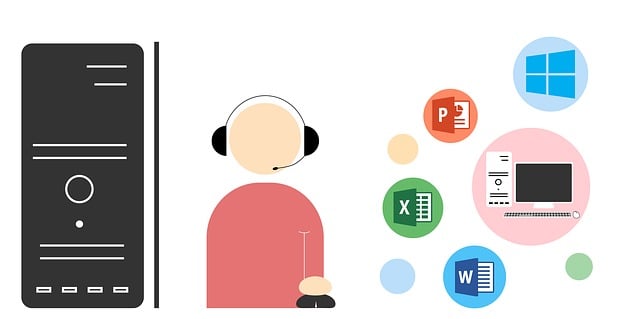In today's digital age, maintaining a healthy work-life balance is challenging due to remote work and constant connectivity. AI-powered virtual support assistants offer a revolutionary solution by automating tasks like scheduling, reminders, and messaging, freeing up time for personal interests and self-care. These smart assistants enhance productivity, improve communication, and reclaim time for meaningful activities, ultimately achieving better work-life integration and overall well-being.
In today’s fast-paced world, striking a balance between work and personal life is a constant challenge. The rise of remote work has exacerbated this issue, blurring the lines between professional and private spheres. This article explores how virtual support in the form of smart assistants can help navigate this modern dilemma. From streamlining daily tasks to enhancing productivity, AI-driven virtual assistants are revolutionizing workflows, enabling individuals to reclaim their time and achieve a harmonious work-life balance.
- Understanding the Modern Work-Life Balance Challenge
- Introducing Virtual Support: The New Office Assistant
- Benefits of Smart Assistants in Daily Tasks
- Integrating AI into Professional Workflows
- Achieving Harmony: Balancing Work and Personal Life with Virtual Help
Understanding the Modern Work-Life Balance Challenge

In today’s fast-paced and interconnected world, maintaining a healthy work-life balance has become an ever-growing challenge. The continuous demand for productivity and instant results often leaves individuals struggling to disconnect from their professional lives, leading to burnout and reduced overall well-being. This modern dilemma is further exacerbated by the blurring lines between personal and professional spaces, especially with the widespread adoption of remote work and digital connectivity. Employees now find themselves working longer hours, feeling compelled to be constantly available due to the accessibility afforded by technology.
Enter virtual support systems, offering a promising solution to this complex issue. Smart assistants powered by artificial intelligence can play a pivotal role in redefining work-life balance by providing efficient and personalized assistance throughout the day. These virtual aides enable individuals to streamline tasks, manage schedules, and set boundaries, ultimately freeing up time for personal pursuits and relaxation. With their help, employees can prioritize self-care, enhance productivity during working hours, and foster a healthier relationship with their work, leading to improved job satisfaction and overall life balance.
Introducing Virtual Support: The New Office Assistant

In today’s fast-paced work environment, maintaining a healthy work-life balance is more challenging than ever. This is where Virtual Support steps in as the new office assistant, revolutionizing the way we approach productivity and leisure. AI-powered smart assistants have emerged as game-changers, offering unparalleled efficiency and convenience to both professionals and individuals seeking to optimize their daily routines.
These virtual assistants act as a personal hub for various tasks, from scheduling appointments and managing calendars to handling reminders and providing quick information access. By automating mundane and time-consuming activities, they free up valuable moments that can be redirected towards more meaningful pursuits, fostering a harmonious work-life integration. With their ability to adapt and learn user preferences, Virtual Support ensures a tailored experience, enhancing overall productivity and satisfaction.
Benefits of Smart Assistants in Daily Tasks

Smart assistants, powered by artificial intelligence, have become invaluable tools in our daily lives, offering a multitude of benefits that enhance productivity and work-life balance. They provide virtual support for various tasks, from scheduling appointments and managing calendars to handling reminders and sending messages. By automating these routine responsibilities, individuals can reclaim valuable time for personal pursuits, family, and relaxation.
These assistants are capable of learning user preferences and habits, allowing them to anticipate needs and streamline processes further. Whether it’s setting alarms, finding relevant information on the web, or controlling smart home devices, virtual support systems ensure that daily tasks become more efficient and less stressful. This frees up mental space, encouraging individuals to focus on complex work, creative pursuits, or simply enjoying leisure activities without constant distractions.
Integrating AI into Professional Workflows

In today’s digital era, integrating Artificial Intelligence (AI) into professional workflows has become a game-changer for many industries. AI-powered virtual support assistants are revolutionizing the way we work by automating mundane tasks and providing intelligent solutions. These assistants can handle a wide range of responsibilities, from scheduling appointments to managing emails, allowing professionals to focus on more complex and creative aspects of their jobs. With their ability to learn and adapt, these virtual supports ensure enhanced productivity and efficiency while reducing human error.
The introduction of AI in professional settings offers numerous benefits, particularly in terms of work-life balance. By offloading repetitive tasks, employees can reclaim valuable time for personal pursuits, family, and self-care. Virtual support assistants can also improve communication and collaboration within teams, as they can efficiently share information and coordinate efforts. This integration is a step towards creating a more balanced and fulfilling professional landscape, where technology works in harmony with human capabilities.
Achieving Harmony: Balancing Work and Personal Life with Virtual Help

In today’s fast-paced world, maintaining a healthy work-life balance can feel like an insurmountable challenge. Long working hours and constant connectivity often leave little room for personal pursuits and rest. However, the emergence of virtual support systems, in the form of smart assistants, is transforming this dynamic. These digital tools are designed to streamline tasks, improve efficiency, and free up valuable time, allowing individuals to reclaim a sense of balance.
By leveraging virtual support, people can delegate mundane or repetitive assignments to AI-powered assistants, focusing instead on more meaningful activities. This shift enables them to spend quality time with family and friends, pursue hobbies, and engage in relaxation without the constant pull of work demands. In essence, smart assistants facilitate a harmonious coexistence between professional and personal spheres, contributing to improved overall well-being.






